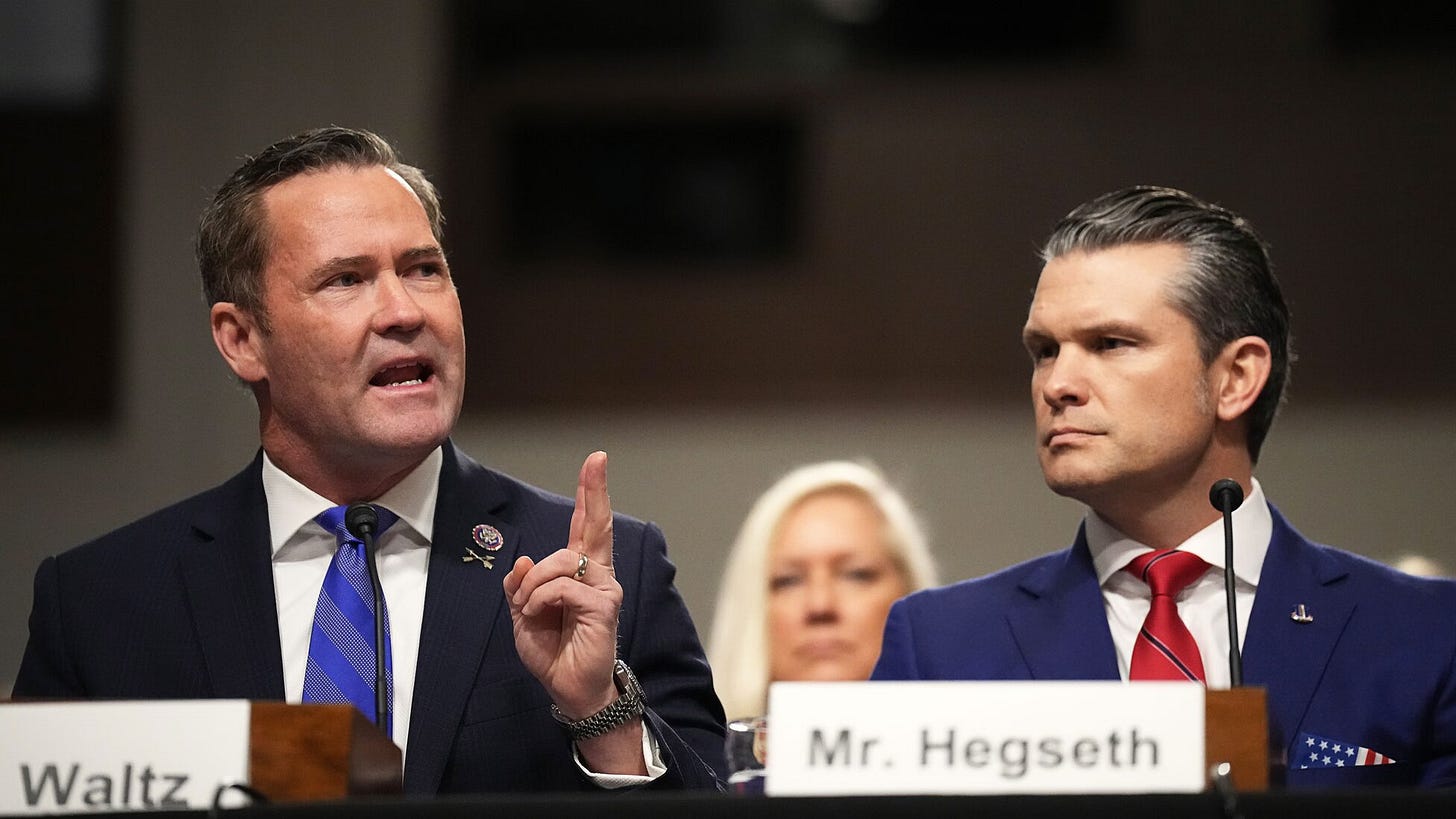Legal Battles, Tariffs, and Union Crackdowns: Trump’s Second Term Faces Growing Resistance
As lawsuits mount over the Yemen chat leak and mass deportations, Trump escalates his backlash against unions, tariffs, and federal oversight.
Trump’s tenth week in office has been marked by unprecedented policy shifts, mass government layoffs, and continued fallout from the “Signalgate” scandal. The controversy stems from an encrypted Signal group chat in which members of Trump’s administration discussed airstrikes on the Houthi group in Yemen. The chat, which may have violated federal law, was inadvertently shared with Jeffrey Goldberg, editor-in-chief of The Atlantic. In response, a federal lawsuit has been filed against multiple Cabinet members.
Meanwhile, Trump’s backlash towards diversity, equity, and inclusion (DEI) initiatives have escalated. After his administration urged the Supreme Court to halt funding for teacher training programs over DEI concerns, a federal judge in Boston temporarily blocked the cuts. The affected programs include math, science, and special education grants.
On Friday, Trump signed an executive order directing federal agencies and Smithsonian museums to remove exhibits deemed “divisive” or “anti-American.” The order primarily targets works addressing race, ethnicity, and gender. At the same time, Utah became the first state to ban LGBTQ+ pride flags from schools and government buildings.
Tensions over trade policy have also intensified. Trump announced a 25% tariff on all car imports, sparking concerns over its impact on the working class and the auto industry.
As part of his broader initiative to downsize the federal government, Trump is set to cut up to 20,000 jobs from the Department of Health and Human Services, reducing its workforce from 82,000 to 62,000. The move follows The Introspective’s previous reporting on Robert F. Kennedy Jr.’s controversial confirmation as Health Secretary. That same day, Trump signed an executive order ending collective bargaining rights for federal employees in national security agencies. However, a federal judge blocked his attempt to dismantle the Consumer Financial Protection Bureau (CFPB), ruling that it violated federal law.
The Fallout over “Signalgate”
As backlash over the “Signalgate” scandal continues, the advocacy group American Oversight has filed a lawsuit against members of Trump’s Cabinet, alleging that their use of the encrypted messaging app Signal violates federal records laws. These laws require the preservation of government-related communications. A previous report also suggested that the Signal group chat may have violated the Espionage Act, a 1917 law that criminalizes the unauthorized dissemination and storage of national defense information.
“This reported disclosure of sensitive military information in a Signal group chat that included a journalist is a five-alarm fire for government accountability and potentially a crime,” Chioma Chukwu, interim executive director of American Oversight, said in a press release.
“War planning doesn’t belong in emoji-laden disappearing group chats. It belongs in secure facilities designed to safeguard national interests—something any responsible government official should have known. Our lawsuit seeks to ensure these federal records are preserved and recovered. The American people deserve answers, and we won’t stop until we get them.”
The lawsuit names Defense Secretary Pete Hegseth, Director of National Intelligence Tulsi Gabbard, CIA Director John Ratcliffe, Treasury Secretary Scott Bessent, Secretary of State Marco Rubio, and the National Archives as defendants.
Despite the controversy, Trump has dismissed the backlash as “fake news” and a “witch hunt,” shifting focus to the airstrike against Houthi forces.
“I think it’s just a witch hunt, and the fake news—like you—talk about it all the time, but it’s just a witch hunt, and it shouldn’t be talked about,” Trump said in an interview with NBC News.
“We had a tremendously successful strike. We struck very hard and very lethal. And nobody wants to talk about that. All they want to talk about is nonsense. It’s fake news.”

He later added that he has no interest in the scandal, despite national security concerns.
“I have no idea what Signal is. I don’t care what Signal is,” Trump said.
Meanwhile, U.S. District Judge James Boasberg, who is presiding over the case, has ordered Cabinet officials to preserve all messages sent and received on Signal between March 11 and March 15.
Supreme Court and DEI Backlash
As Trump continues his backlash towards diversity, equity, and inclusion (DEI) policies, he asked the Supreme Court to cut millions of dollars in teacher training programs. While a federal judge in Boston blocked the proposed cuts, the affected programs would have focused on math, science, and special education.
Further backlash against DEI policies escalated after Trump signed an executive order Thursday directing federal agencies and Smithsonian museums to remove exhibits deemed “divisive” and “anti-American.” The order also instructs Vice President J.D. Vance and Interior Secretary Doug Burgum to restore monuments, memorials, and statues that “have been improperly removed or changed in the last five years to perpetuate a false revision of history or improperly minimize or disparage certain historical figures or events.”
Additionally, the order prohibits the American Women’s History Museum from recognizing transgender women “in any respect,” stating that federal funding will be revoked for exhibits and programs that “degrade shared American values, divide Americans based on race, or promote programs or ideologies inconsistent with federal law.”
Jim Grossman, executive director of the American Historical Association (AHA), criticized the executive order in a report by NPR, arguing that it misrepresents the Smithsonian, which consists of 21 museums and 14 research and education centers. While the Smithsonian receives federal funding, it is not a federal agency.
“It misrepresents the work of the Smithsonian, which is one of the great research institutions in the world,” Grossman said.
“Arguing that the Smithsonian somehow misleads people, somehow is unpatriotic, somehow is saying things that are not true—that’s simply not true.”
Meanwhile, Utah became the first state to ban LGBTQ+ pride flags at schools and government buildings after Gov. Spencer Cox allowed the bill to become law without his signature, despite expressing concerns.
“I continue to have serious concerns with this bill,” Cox said in a report by the Utah News Dispatch.
“However, because a veto would be overridden, I have decided to allow the bill to go into law without my signature and urge lawmakers to consider commonsense solutions that address the bill’s numerous flaws.”
In a CBS News report, Cox reaffirmed his support for the LGBTQ+ community but dismissed the legislation as a “blood sport.”
“To our LGBTQ community, I know that recent legislation has been difficult,” Cox said.
“Politics can be a bit of a blood sport at times, and I know we’ve had our disagreements. I want you to know that I love and appreciate you and I am grateful that you are part of our state. I know these words may ring hollow to many of you, but please know that I mean them sincerely.”
The law—known as HB77—prohibits nearly all flags from being flown in government buildings, except for the American flag, the state flag, military flags, and flags promoting the Olympics and universities. With its passage, Utah became the first state to implement flag restrictions in government buildings.
Trade War Escalation: 25% Car Tariff
As tensions over tariffs continue, President Trump announced Wednesday a 25% tariff on all imported cars. Vehicles covered under the Canada-United States-Mexico Agreement (CUSMA)—established during his first term—will also face tariffs on foreign parts, such as imported engines.
“This is the beginning of Liberation Day in America,” Trump said.
“We’re going to charge countries for doing business in our country and taking jobs, taking our wealth, taking so much out of our country.”
Global leaders reacted swiftly to the executive order. French President Emmanuel Macron told the BBC that “now is not the time” for the United States to impose additional tariffs.
“Imposing tariffs means breaking value chains. It creates, in the short term, an inflationary effect and destroys jobs,” Macron said.
Chinese officials also condemned the decision, accusing Trump of violating World Trade Organization (WTO) rules.
“There are no winners in a trade war or a tariff war. No country’s development and prosperity has been achieved by imposing tariffs,” a Chinese Foreign Ministry spokesperson said in the same report.
A Reuters analysis found that the tariffs will significantly impact the working class, as many Americans already face growing financial uncertainty. The report noted that new cars now average over $50,000, while vehicles priced under $30,000 are becoming increasingly rare, forcing more consumers to turn to used cars.
“People are struggling to afford new cars, so they’re looking at used ones instead,” said Burnis Carrington, a Louisiana resident.
A CNBC study found that more than 47% of cars sold in the U.S. are imported, and used car prices typically reflect the rising cost of new vehicles.
Despite concerns over the impact on businesses and consumers, Trump dismissed worries about rising prices in an interview with NBC News’ Kristen Welker.
“I couldn’t care less. I hope they raise their prices, because if they do, people are gonna buy American-made cars. We have plenty,” Trump said.
The tariffs are set to take effect April 2.
Layoffs, Unions, and Federal Worker Rights
Continuing with President Trump’s initiative to downsize the federal government, the Department of Health and Human Services (HHS) announced Thursday that more than 20,000 employees will be laid off. This follows a wave of buyout offers and early retirements, which had already reduced the workforce from 82,000 to 62,000.
“We aren’t just reducing bureaucratic sprawl. We are realigning the organization with its core mission and our new priorities in reversing the chronic disease epidemic,” Health Secretary Robert F. Kennedy Jr. said in a press release.
“This overhaul will be a win-win for taxpayers and for those that HHS serves. That’s the entire American public, because our goal is to Make America Healthy Again.”
The announcement sparked backlash from health officials, as the cuts impact positions at the Centers for Disease Control and Prevention (CDC) and the Food and Drug Administration (FDA).
“Losing that much staff will impact our ability to have those important, meaningful conversations to keep our state healthy and safe,” Illinois Department of Public Health Director Dr. Sameer Vohra told ABC Chicago, noting that the layoffs will result in the loss of key experts.
“We want the most qualified, dedicated people to come into these government spaces to protect our health.”
Maryland Sen. Chris Van Hollen told WBAL that he believes the cuts are illegal.
“There are very clear due-process rules that you have to go through when you’re undertaking that kind of reorganization,” Van Hollen said.
“There are also big questions about whether or not this violates the Impoundment Control Act because Congress has appropriated funds for specific purposes and specific agencies. Obviously, you can’t carry out those functions if you fire everybody who’s involved.”
That same day, Trump signed an executive order aimed at ending collective bargaining with federal labor unions in agencies with national security missions.
The order, Exclusions From Federal Labor-Management Relations Programs, affects multiple departments, including the State Department, Department of Defense, Department of Veterans Affairs, Department of Justice, and HHS.
While the White House issued a statement claiming that Trump supports “constructive partnerships” with unions, the American Federation of Government Employees (AFGE)—which represents more than 820,000 federal workers—told the Associated Press it is preparing legal action.
“We will fight relentlessly to protect our rights, our members, and all working Americans from these unprecedented attacks,” the union said.
AFGE President Everett Kelley condemned the order as “a disgraceful and retaliatory attack on the rights of hundreds of thousands of patriotic American civil servants—nearly one-third of whom are veterans—simply because they are members of a union that stands up to his harmful policies.”
Meanwhile, a federal judge on Friday blocked the Trump administration from disbanding the Consumer Financial Protection Bureau (CFPB). The bureau—founded after the 2008 financial crisis—had faced controversy after Acting Director Russell T. Vought initiated mass firings and layoffs, closed offices, and canceled essential contracts with vendors for staffing and operational services.






